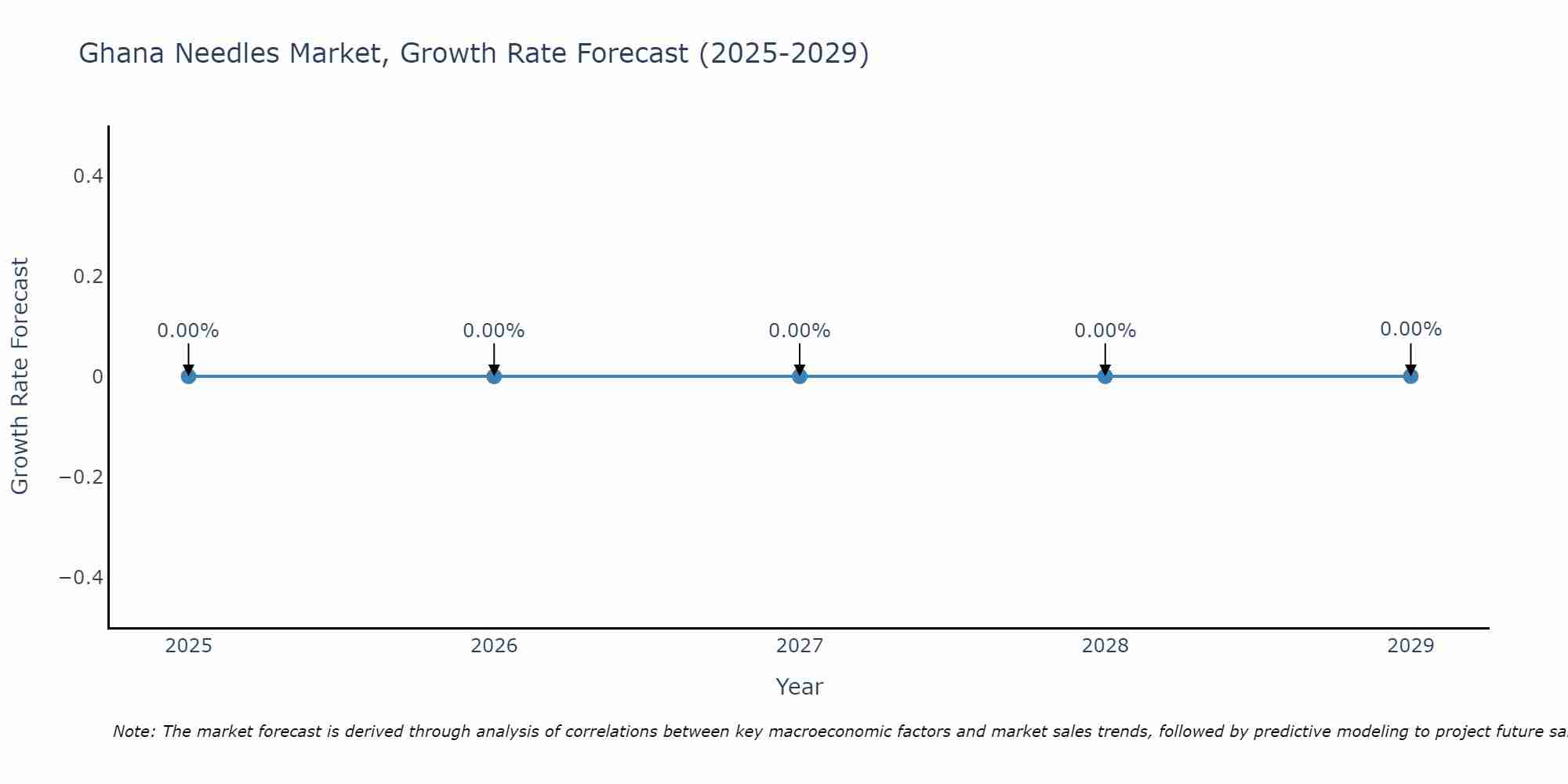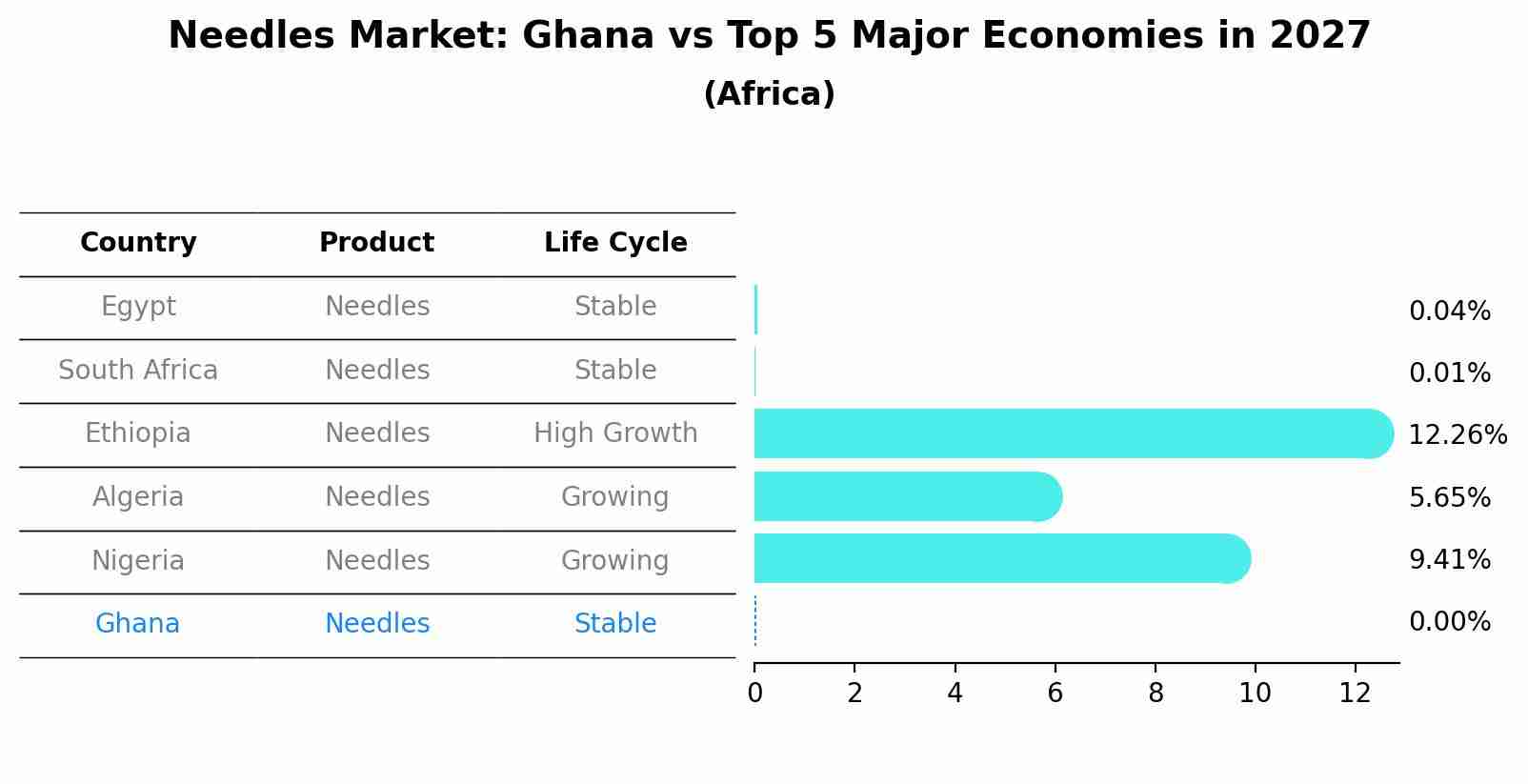Ghana Needles Market (2025-2031) Outlook | Forecast, Growth, Trends, Share, Companies, Value, Analysis, Revenue, Size & Industry
| Product Code: ETC376376 | Publication Date: Aug 2022 | Updated Date: Jul 2025 | Product Type: Market Research Report | |
| Publisher: 6Wresearch | Author: Ravi Bhandari | No. of Pages: 75 | No. of Figures: 35 | No. of Tables: 20 |
Ghana Needles Market Size Growth Rate
The Ghana Needles Market is likely to experience consistent growth rate gains over the period 2025 to 2029. From 0.00% in 2025, the growth rate steadily ascends to 0.00% in 2029.

Needles Market: Ghana vs Top 5 Major Economies in 2027 (Africa)
By 2027, the Needles market in Ghana is anticipated to reach a growth rate of 0.00%, as part of an increasingly competitive Africa region, where Egypt remains at the forefront, supported by South Africa, Ethiopia, Algeria and Nigeria, driving innovations and market adoption across sectors.

Ghana Needles Market Synopsis
The Ghana Needles Market is a growing segment within the healthcare industry, driven by factors such as increasing healthcare expenditure, a rising prevalence of chronic diseases, and advancements in medical technology. This market primarily consists of various types of needles used in healthcare settings, including hypodermic needles, biopsy needles, suturing needles, and more. Key players in the Ghana Needles Market include both domestic manufacturers and international companies. The market is characterized by intense competition, with players focusing on product innovation, quality, and cost-effectiveness to gain a competitive edge. Additionally, the market is influenced by government regulations and policies related to healthcare products. As the healthcare sector in Ghana continues to evolve and expand, the demand for needles is expected to grow, presenting opportunities for market expansion and development.
Ghana Needles Market Trends
The Ghana Needles Market is experiencing a shift towards the growing demand for high-quality and technologically advanced needles. There is a rise in the adoption of safety needles due to increasing awareness about needlestick injuries and the transmission of infections. Healthcare facilities are increasingly seeking needles that offer enhanced precision, durability, and patient comfort. Additionally, the market is witnessing a trend towards the use of eco-friendly and sustainable materials in needle production to align with global sustainability initiatives. As the healthcare sector in Ghana continues to advance, the needles market is expected to see further innovation in product design and materials to meet the evolving needs of healthcare providers and patients.
Ghana Needles Market Challenges
In the Ghana Needles Market, challenges such as counterfeit products, inadequate quality control measures, and price competition from cheaper imported needles are commonly faced. Counterfeit products not only undermine the reputation of genuine brands but also pose safety risks to users. The lack of stringent quality control measures can lead to inconsistent product quality, affecting user experience and potentially causing harm. Additionally, the influx of lower-priced imported needles from countries with lower production costs can put pressure on local manufacturers to compete on price, impacting their profitability and market share. Addressing these challenges requires a combination of stricter regulations, quality assurance protocols, and innovation to differentiate local products in terms of quality and value.
Ghana Needles Market Investment Opportunities
The Ghana needles market presents promising investment opportunities due to the increasing demand for healthcare services and a growing population. With advancements in medical technology and an emphasis on quality healthcare, there is a rising need for high-quality needles for medical procedures, vaccinations, and blood tests. Investors can explore opportunities in manufacturing and supplying a wide range of needles, including hypodermic needles, blood collection needles, and acupuncture needles. Additionally, there is potential for innovation in needle design to cater to specific medical needs and address concerns around safety and efficiency. Collaborating with healthcare facilities, distributors, and government agencies can help investors tap into this growing market and contribute to improving healthcare services in Ghana.
Jordan Agar Market Government Policies
Government policies related to the Ghana needles market primarily focus on ensuring the quality and safety of medical devices, including needles, to protect public health. The Ghana Food and Drugs Authority (FDA) regulates the registration, importation, and distribution of needles to ensure they meet established standards and specifications. Additionally, there are policies in place to address counterfeit needles and promote local manufacturing to reduce reliance on imports. The government also supports initiatives to increase access to needles in healthcare facilities, especially in rural areas, to enhance healthcare delivery. Overall, government policies in Ghana related to the needles market aim to promote quality, safety, and accessibility of medical devices to improve healthcare outcomes for the population.
Ghana Needles Market Future Outlook
The future outlook for the Ghana Needles Market appears positive, driven by factors such as increasing healthcare expenditure, a growing population, and rising prevalence of chronic diseases that require regular medical interventions. The market is expected to benefit from advancements in healthcare infrastructure and technology, leading to improved access to healthcare services across the country. Additionally, the rising awareness about the importance of safe medical practices is likely to drive the demand for high-quality needles in Ghana. However, the market may face challenges such as pricing pressure and competition from alternative treatment methods. Overall, with the increasing focus on healthcare quality and accessibility, the Ghana Needles Market is projected to experience steady growth in the coming years.
Key Highlights of the Report:
- Ghana Needles Market Outlook
- Market Size of Ghana Needles Market, 2024
- Forecast of Ghana Needles Market, 2031
- Historical Data and Forecast of Ghana Needles Revenues & Volume for the Period 2021 - 2031
- Ghana Needles Market Trend Evolution
- Ghana Needles Market Drivers and Challenges
- Ghana Needles Price Trends
- Ghana Needles Porter's Five Forces
- Ghana Needles Industry Life Cycle
- Historical Data and Forecast of Ghana Needles Market Revenues & Volume By Type for the Period 2021 - 2031
- Historical Data and Forecast of Ghana Needles Market Revenues & Volume By Conventional for the Period 2021 - 2031
- Historical Data and Forecast of Ghana Needles Market Revenues & Volume By Safety for the Period 2021 - 2031
- Historical Data and Forecast of Ghana Needles Market Revenues & Volume By Product for the Period 2021 - 2031
- Historical Data and Forecast of Ghana Needles Market Revenues & Volume By Pen for the Period 2021 - 2031
- Historical Data and Forecast of Ghana Needles Market Revenues & Volume By Suture for the Period 2021 - 2031
- Historical Data and Forecast of Ghana Needles Market Revenues & Volume By Blood Collection for the Period 2021 - 2031
- Historical Data and Forecast of Ghana Needles Market Revenues & Volume By Dental for the Period 2021 - 2031
- Historical Data and Forecast of Ghana Needles Market Revenues & Volume By Ophthalmic for the Period 2021 - 2031
- Historical Data and Forecast of Ghana Needles Market Revenues & Volume By Others for the Period 2021 - 2031
- Historical Data and Forecast of Ghana Needles Market Revenues & Volume By Delivery Mode for the Period 2021 - 2031
- Historical Data and Forecast of Ghana Needles Market Revenues & Volume By Hypodermic for the Period 2021 - 2031
- Historical Data and Forecast of Ghana Needles Market Revenues & Volume By Intravenous for the Period 2021 - 2031
- Historical Data and Forecast of Ghana Needles Market Revenues & Volume By Intramuscular for the Period 2021 - 2031
- Historical Data and Forecast of Ghana Needles Market Revenues & Volume By Others for the Period 2021 - 2031
- Historical Data and Forecast of Ghana Needles Market Revenues & Volume By Raw Material for the Period 2021 - 2031
- Historical Data and Forecast of Ghana Needles Market Revenues & Volume By Stainless Steel for the Period 2021 - 2031
- Historical Data and Forecast of Ghana Needles Market Revenues & Volume By Glass for the Period 2021 - 2031
- Historical Data and Forecast of Ghana Needles Market Revenues & Volume By Others for the Period 2021 - 2031
- Ghana Needles Import Export Trade Statistics
- Market Opportunity Assessment By Type
- Market Opportunity Assessment By Product
- Market Opportunity Assessment By Delivery Mode
- Market Opportunity Assessment By Raw Material
- Ghana Needles Top Companies Market Share
- Ghana Needles Competitive Benchmarking By Technical and Operational Parameters
- Ghana Needles Company Profiles
- Ghana Needles Key Strategic Recommendations
Frequently Asked Questions About the Market Study (FAQs):
- Single User License$ 1,995
- Department License$ 2,400
- Site License$ 3,120
- Global License$ 3,795
Search
Thought Leadership and Analyst Meet
Our Clients
Related Reports
- Afghanistan Apparel Market (2026-2032) | Growth, Outlook, Industry, Segmentation, Forecast, Size, Companies, Trends, Value, Share, Analysis & Revenue
- Canada Oil and Gas Market (2026-2032) | Share, Segmentation, Value, Industry, Trends, Forecast, Analysis, Size & Revenue, Growth, Competitive Landscape, Outlook, Companies
- Germany Breakfast Food Market (2026-2032) | Industry, Share, Growth, Size, Companies, Value, Analysis, Revenue, Trends, Forecast & Outlook
- Australia Briquette Market (2025-2031) | Growth, Size, Revenue, Forecast, Analysis, Trends, Value, Share, Industry & Companies
- Vietnam System Integrator Market (2025-2031) | Size, Companies, Analysis, Industry, Value, Forecast, Growth, Trends, Revenue & Share
- ASEAN and Thailand Brain Health Supplements Market (2025-2031) | Strategy, Consumer Insights, Analysis, Investment Trends, Opportunities, Growth, Size, Share, Industry, Revenue, Segments, Value, Segmentation, Supply, Forecast, Restraints, Outlook, Competition, Drivers, Trends, Demand, Pricing Analysis, Competitive, Strategic Insights, Companies, Challenges
- ASEAN Bearings Market (2025-2031) | Strategy, Consumer Insights, Analysis, Investment Trends, Opportunities, Growth, Size, Share, Industry, Revenue, Segments, Value, Segmentation, Supply, Forecast, Restraints, Outlook, Competition, Drivers, Trends, Demand, Pricing Analysis, Competitive, Strategic Insights, Companies, Challenges
- Europe Flooring Market (2025-2031) | Outlook, Share, Industry, Trends, Forecast, Companies, Revenue, Size, Analysis, Growth & Value
- Saudi Arabia Manlift Market (2025-2031) | Outlook, Size, Growth, Trends, Companies, Industry, Revenue, Value, Share, Forecast & Analysis
- Uganda Excavator, Crane, and Wheel Loaders Market (2025-2031) | Strategy, Consumer Insights, Analysis, Investment Trends, Opportunities, Growth, Size, Share, Industry, Revenue, Segments, Value, Segmentation, Supply, Forecast, Restraints, Outlook, Competition, Drivers, Trends, Demand, Pricing Analysis, Competitive, Strategic Insights, Companies, Challenges
Industry Events and Analyst Meet
Whitepaper
- Middle East & Africa Commercial Security Market Click here to view more.
- Middle East & Africa Fire Safety Systems & Equipment Market Click here to view more.
- GCC Drone Market Click here to view more.
- Middle East Lighting Fixture Market Click here to view more.
- GCC Physical & Perimeter Security Market Click here to view more.
6WResearch In News
- Doha a strategic location for EV manufacturing hub: IPA Qatar
- Demand for luxury TVs surging in the GCC, says Samsung
- Empowering Growth: The Thriving Journey of Bangladesh’s Cable Industry
- Demand for luxury TVs surging in the GCC, says Samsung
- Video call with a traditional healer? Once unthinkable, it’s now common in South Africa
- Intelligent Buildings To Smooth GCC’s Path To Net Zero


















